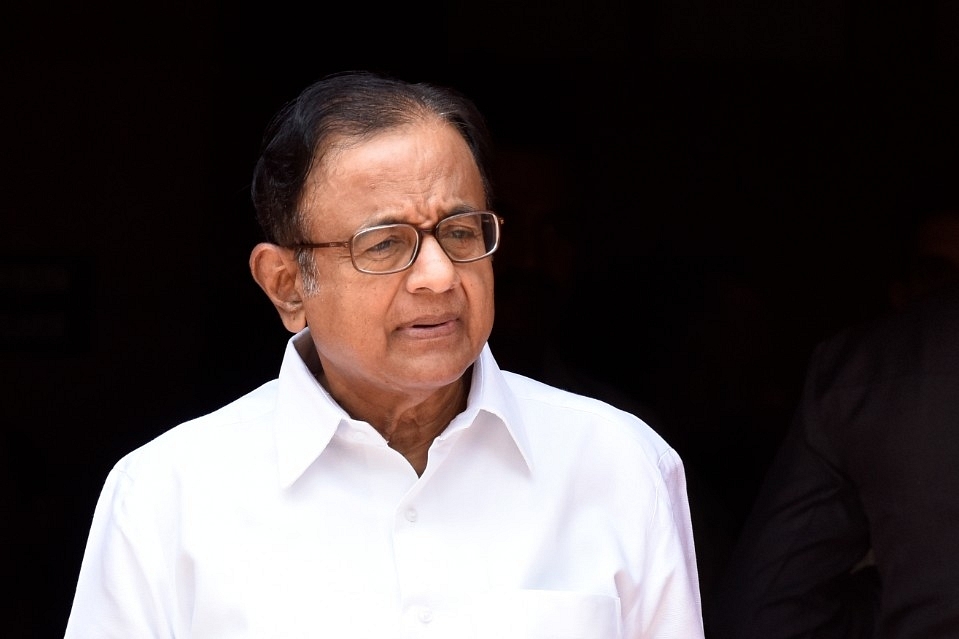Politics
Bail As Exoneration: What Chidambaram Case Tells Us About Public Attitudes To High Crimes
- There is a huge reluctance to see any politician punished for his crimes.
- We are happy to see people being humiliated, but not finally punished.

Former finance minister P Chidambaram. (Mohd Zakir/ Hindustan Times via GettyImages)
Soon after former finance minister P Chidambaram was released on bail after 100-plus-days of custodial interrogation in multiple cases, the Congress party tweeted #SatyamevaJayate. Earlier this year, when his son Karti Chidambaram was subjected to custodial interrogation in the INX Media case, he showed a clenched fist and exuded defiance as he was being shepherded from jail to court and back.
Karnataka Congress politician D K Shivakumar, accused of money laundering, was given a hero’s welcome in Bengaluru last October when he was released on bail after questioning.
A Raja, widely seen as the author of the 2G scam, lost no time in calling Vinod Rai, the former Comptroller and Auditor General (CAG), a contract-killer who needed to be prosecuted for merely daring to put a value on the scale of the 2G scam losses after a special court exonerated him. His exoneration is being challenged in the higher courts.
There must be something warped about our politicians’ sense of right and wrong that any case launched against any one of them equals vendetta, bail equals exoneration, and temporary exoneration in lower court means the boot must now be on the other foot, where the accused now has the right to accuse everyone else, including constitutional authorities or his prosecutors, of mala fide intent.
The Gandhis, Sonia and Rahul, are out on bail for what – at first glance – appears to be an open-and-shut case of mala fide transfer of a valuable asset to their private trust for inadequate consideration (the National Herald case), but even the media is hesitant to question them on this. It is assumed that this must be political vendetta because of the long-term antagonism between the Bharatiya Janata Party and the Congress party, and especially the Gandhi family.
There is surely something wrong in the Indian public ethos where we are all happy to see someone’s name dragged in the mud with or without proof, but the minute they are hauled up for interrogation or sent to jail or even convicted, all is forgiven. The same people we thought of as crooks become heroes in the public eye. There is a huge reluctance to see any politician punished for his crimes. We are happy to see people being humiliated, but not finally punished.
This is the exact opposite of our attitudes towards other criminals, where a thief is beaten to pulp if he is caught, or an alleged rapist is sought to be paraded in public and thrashed to death for his as yet unproven crimes. In the brutal rape and murder of a 27-year-old Telangana vet, many members of Parliament, including Jaya Bachchan, wanted punishments ranging from a public lynching to castration of the accused.
Our attitudes towards politicians prefer public muck-raking over actual convictions, while in the case of crimes by ordinary individuals, we prefer public punishment even before a crime is proven. We want nothing more than media humiliation for our politicians, but we want punishments of the most violent kind for the rest.
Indians clearly need to ask themselves why this is so. Why are we willing to wound but afraid to strike when it comes to public personalities, but want to kill and maim ordinary citizens merely to give vent to our rage?
Support Swarajya's 50 Ground Reports Project & Sponsor A Story
Every general election Swarajya does a 50 ground reports project.
Aimed only at serious readers and those who appreciate the nuances of political undercurrents, the project provides a sense of India's electoral landscape. As you know, these reports are produced after considerable investment of travel, time and effort on the ground.
This time too we've kicked off the project in style and have covered over 30 constituencies already. If you're someone who appreciates such work and have enjoyed our coverage please consider sponsoring a ground report for just Rs 2999 to Rs 19,999 - it goes a long way in helping us produce more quality reportage.
You can also back this project by becoming a subscriber for as little as Rs 999 - so do click on this links and choose a plan that suits you and back us.
Click below to contribute.
Latest